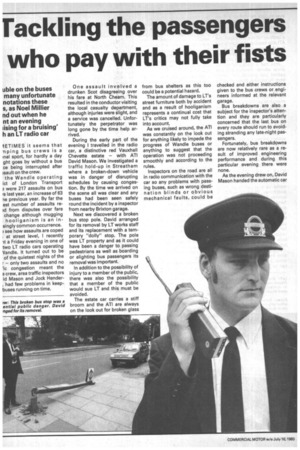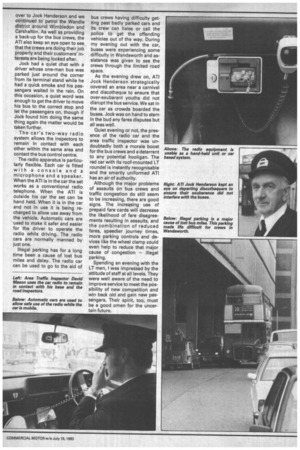Tackling the passengers who pay with their fists
Page 54

Page 55

If you've noticed an error in this article please click here to report it so we can fix it.
uble on the buses many unfortunate notations these s, as Noel Millier nd out when he nt an evening lising for a bruising' h an IT radio car 1ETIMES it seems that -nping bus crews is a Ina' sport, for hardly a day ght goes by without a bus ce being interrupted after ;sault on the crew.
the Wandle operating ict of London Transport 3 were 217 assaults on bus rs last year, an increase of 63 le previous year. By far the est number of assaults re)d from disputes over fare change although mugging hooliganism is an insingly common occurrence. ) see how assaults are coped at street level, I recently it a Friday evening in one of two LT radio cars operating Vendle. It turned out to be of the quietest nights of the — only two assaults and no 'lc congestion meant the s crew, area traffic inspectors id Mason and Jock Hender, had few problems in keepbuses running on time. One assault involved a drunken Scot disagreeing over his fare at North Cheam. This resulted in the conductor visiting the local casualty department, although injuries were slight, and a service was cancelled. Unfortunately the perpetrator was long gone by the time help arrived.
During the early part of the evening I travelled in the radio car, a distinctive red Vauxhall Chevette estate — with ATI David Mason. We investigated a traffic hold-up in Streatham where a broken-down vehicle was in danger of disrupting schedules by causing congestion. By the time we arrived on the scene all was clear and any buses had been seen safely round the incident by a inspector from nearby Brixton garage.
Next we discovered a broken bus stop pole. David arranged for its removal by LT works staff and its replacement with a temporary "dolly" stop. The pole was LT property and as it could have been a danger to passing pedestrians as well as boarding or alighting bus passengers its removal was important.
In addition to the possibility of injury to a member of the public, there was also the possibility that a member of the public would sue LT and this must be avoided.
The estate car carries a stiff broom and the ATI are always on the look out for broken glass from bus shelters as this too could be a potential hazard.
The amount of damage to LT's street furniture both by accident and as a result of hooliganism represents a continual cost that LT's critics may not fully take into account.
As we cruised around, the ATI was constantly on the look out for anything likely to impede the progress of Wandle buses or anything to suggest that the operation was not proceeding smoothly and according to the rules.
Inspectors on the road are all in radio communication with the car so any problems with passing buses, such as wrong destination blinds or obvious mechanical faults, could be checked and either instructions given to the bus crews or engineers informed at the relevant garage.
Bus breakdowns are also a subject for the inspector's attention and they are particularly concerned that the last bus on every route should run to avoiding stranding any late-night passengers.
Fortunately, bus breakdowns are now relatively rare as a result of improved engineering performance and during this particular evening there were none.
As the evening drew on, David Mason handed the automatic car over to Jock Henderson and we continued to patrol the Wandle district around Wimbledon and Carshalton. As well as providing a back-up for the bus crews, the ATI also keep an eye open to see that the crews are doing their job properly and their customers' interests are being looked after.
Jock had a quiet chat with a driver whose one-man bus was parked just around the corner from its terminal stand while he had a quick smoke and his passengers waited in the rain. On this occasion, a quiet word was enough to get the driver to move his bus to the correct stop and let the passengers on, though if Jock found him doing the same thing again the matter would be taken further.
The car's two-way radio system allows the inspectors to remain in contact with each other within the same area and contact the bus control centre.
The radio apparatus is particularly flexible. Each car is fitted with a console and a microphone and a speaker. When the ATI is in the car the set works as a conventional radio telephone. When the ATI is outside his car the set can be hand held. When it is in the car and not in use it is being recharged to allow use away from the vehicle. Automatic cars are used to make it safer and easier for the driver to operate the radio while driving. The radio cars are normally manned by just one.
Illegal parking has for a long time been a cause of lost bus miles and delay. The radio car can be used to go to the aid of bus crews having difficulty getting past badly parked cars and its crew can liaise or call the police to get the offending vehicles out of the way. During my evening out with the car, buses were experiencing some difficulty in Wandsworth and assistance was given to see the crews through the limited road space.
As the evening drew on, ATI Jock Henderson strategically covered an area near a carnival and discotheque to ensure that over-exuberant youths did not disrupt the bus service. We sat in the car as crowds boarded the buses. Jock was on hand to stem in the bud any fares disputes but all was well.
Quiet evening or not, the presence of the radio car and the area traffic inspector was un doubtedly both a morale boost for the bus crews and a deterrent to any potential hooligan. The red car with its roof-mounted LT roundel is instantly recognisable and the smartly uniformed ATI has an air of authority.
Although the major problems of assaults on bus crews and traffic congestion do still seem to be increasing, there are good signs. The increasing use of prepaid fare cards will decrease the likelihood of fare disagree ments resulting in assaults, and the combination of reduced fares, speedier journey times, more parking controls and devices like the wheel clamp could even help to reduce that major cause of congestion — illegal parking.
Spending an evening with the LT men, I was impredsed by the attitude of staff at all levels. They were well aware of the need to improve service to meet the pos
sibility of new competition and win back old and gain new passengers. Their spirit, too, must be a good omen for the uncertain future.
























































































